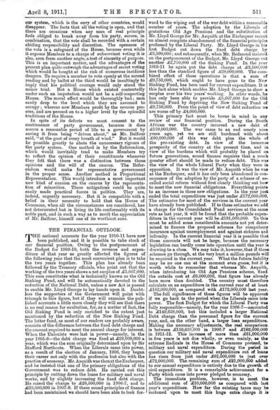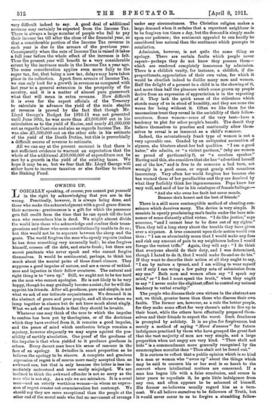THE FINANCIAL OUTLOOK.
THE national accounts for the year 1910-11 have now been published, and it is possible to take stock of our financial position. Owing to the postponement of the Budget for 1909-10, both the revenue and expen- diture of that year so greatly affected the figures of the following year that the most convenient plan is to take the two years together. This plan has already been followed by the Treasury officials, who point out that the working of the two years shows a net surplus of £5,607,000. This sum constitutes what is technically known as the Old Sinking Fund, and will be automatically devoted to the reduction of the National Debt, unless a new Act is passed to enable Mr. Lloyd George to lay hands upon it. Doubt- less the supporters of the Government will point with triumph to this figure, but if they will examine the pub- lished accounts a little more closely they will see that there is no real reason for exultation, for, as a matter of fact, the Old Sinking Fund is only enriched to the extent just mentioned by the reduction of the New Sinking Fund. The latter fund, as most of our readers are probably aware, consists of the difference between the fixed debt charge and the amount required to meet the annual charge for interest. When the Unionists were last in power—namely, in the year 1905-6—the debt charge was fixed at £28,000,000 a year, which was the sum originally determined upon by Sir Stafford Northcote. When the Liberals came into power, as a result of the election of January, 1906, they began their career not only with the profession but also with the practice of economy. Mr. Asquith was then at the Exchequer, and he insisted that one of the primary obligations of the Government was to reduce debt. He carried out this principle by cutting down the loans for military and naval works, and by slightly increasing the fixed debt charge. He raised the charge to £28,500,000 in 1906-7, and to £29,500,000 in 1907-8. If these sound principles of finance had been maintained we should have been able to look for- ward to the wiping out of the war debt within a reasonable number of years. The adoption by the Liberals of gratuitous Old Age Pensions and the substitution of Mr. Lloyd George for Mr. Asquith at the Exchequer meant an almost complete abandonment of the financial principles professed by the Liberal Party. Mr. Lloyd George in his first Budget cut down the fixed debt charge by £3,500,000 ; and subsequently, when Mr. Redmond insisted - on the postponement of the Budget, Mr. Lloyd George cut another £2,750,000 off the Sinking Fund. In the year 1910-11 he again put the debt charge at £3,500,000 less than the standard figure of £28,000,000. The com- bined effect of these operations is that a sum of £ 9,750,000, which ought to have gone to the New Sinking Fund, has been used for current expenditure. It is this fact alone which enables Mr. Lloyd George to show a surplus over his two years' working. In other words, he has only been able to provide £5,607,000 for the Old Sinking Fund by depriving the New Sinking Fund of £9,750,000. From the point of view of debt reduction we are worse off by £4,000,000.
This primary fact must be borne in mind. in any review of our financial position. During the South African war the country incurred a new debt of £ 159,000,000. The war came to an end nearly nine years ago, yet we are still burdened with about £80,000,000 of this war debt plus the whole of the pre-existing debt. In view of the immense prosperity of the country at the present time, and in view of the burdens which will probably be placed on future generations, sound finance requires that a much greater effort should be made to reduce debt. This was the view of the whole Liberal Party when they were in opposition. It was the view of Mr. Asquith when he was at the Exchequer, and it has only been abandoned in con- sequence of the adoption by the party of a scheme of so- called social reform without first clearly thinking out how to meet the new financial obligations. Everything points to an increase in these new obligations. In the year just ended the total expenditure was just under £172,000,000. The estimates for most of the services in the current year have already been published. If to these estimates we add a charge for the Consolidated Fund services at the same rate as last year, it will be found that the probable expen- diture in the current year will be £181,000,000. To this must be added some considerable amounts not yet deter- mined to finance the proposed schemes for compulsory insurance against unemployment and against sickness and infirmity. In the current financial year it is possible that these amounts will not be large, because the necessary legislation can hardly come into operation until the year is drawing to a close. We may take it, however, that if these schemes go through, at the very least a million pounds will be required in the current year. What the future liability may be no one can at the moment even guess, but it is worth while to remember that whereas Mr. Asquith, when introducing his Old Age Pensions scheme, fixed the outside cost at £6,000,000, that figure has already been more than doubled. The country must therefore calculate on an expenditure in the current year of at least £182,000,000, as compared with £172,000,000 last year.
The full significance of these figures will be apparent if we go back to the period when the Liberals came into power. The first Budget for which the Liberal Party was fully responsible—namely, for the year 1906-7—amounted to £149,638,000, but this included a larger National Debt charge than the presumed. figure for the current year, and, on the other hand, a larger loan expenditure. Making the necessary adjustments, the real comparison is between £150,638,000 in 1906-7 and £182,000,000 in 1911-12. This increase of more than £31,000,000 in five years is not due wholly, or even mainly, as the extreme Radicals in the House of Commons pretend, to military and naval expenditure. During the period in question our military and naval e• • diture out of loans has risen from just under Z62,011,000 to just over £72,000,000. The remaining sum of £21,000,000 added to our annual expenditure is entirely due to the growth of civil expenditure. It is a remarkable achievement for a Party which came into power pledged to economy. The immediate problem, however, is to meet the additional sum of £10,000,000 as compared with last year's expenditure. How far the existing taxes may be reckoned upon to meet this huge extra charge it is very difficult indeed to say. A good deal of additional revenue may certainly be expected from the Income Tax. There is always a large number of people who fail to pay their income tax till after the close of the financial year, so that a considerable portion of the Income Tax revenue in each year is due to the arrears of the previous year. Consequently when the rate of Income Tax is raised it takes a full year before the whole effect of the increase is felt. Thus the present year will benefit to a very considerable extent by the increases made in the Income Tax a year ago. The same consideration applies even more fully to the super tax, for, that being a new tax, delays may have taken place in its collection. Apart from arrears of Income Tax, we can only look for a growth in revenue as compared with last year to a general extension in the prosperity of the country, and it is a matter of almost pure guesswork what that will mean in extra revenue. How difficult it is even for the expert officials of the Treasury to calculate in advance the yield of the main staples of revenue is proved by the fact that though Mr. Lloyd George's Budget for 1910-11 was not presented until June 30th, he was more than £3,000,000 out in his calculation as to the yield of Excise, and nearly £1,000,000 out as regards Customs and also as regards Income Tax. He was also £1,500,000 out on the other side in his estimate of the yield of the Death Duties, but this is proverbially a difficult source of revenue to estimate.
All we can say at the present moment is that there is not sufficient evidence to warrant an expectation that the whole of the additional £10,000,000 of expenditure can be met by a growth is the yield of the existing taxes. We hope it may be so, but we fear that Mr. Lloyd George will either have to increase taxation or else further to reduce the Sinking Fund.











































 Previous page
Previous page